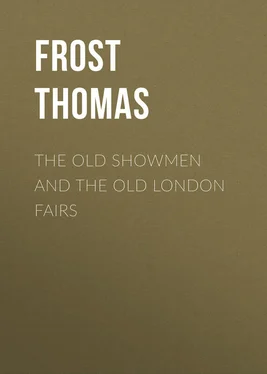Thomas Frost - The Old Showmen and the Old London Fairs
Здесь есть возможность читать онлайн «Thomas Frost - The Old Showmen and the Old London Fairs» — ознакомительный отрывок электронной книги совершенно бесплатно, а после прочтения отрывка купить полную версию. В некоторых случаях можно слушать аудио, скачать через торрент в формате fb2 и присутствует краткое содержание. Жанр: foreign_antique, foreign_prose, на английском языке. Описание произведения, (предисловие) а так же отзывы посетителей доступны на портале библиотеки ЛибКат.
- Название:The Old Showmen and the Old London Fairs
- Автор:
- Жанр:
- Год:неизвестен
- ISBN:нет данных
- Рейтинг книги:4 / 5. Голосов: 1
-
Избранное:Добавить в избранное
- Отзывы:
-
Ваша оценка:
- 80
- 1
- 2
- 3
- 4
- 5
The Old Showmen and the Old London Fairs: краткое содержание, описание и аннотация
Предлагаем к чтению аннотацию, описание, краткое содержание или предисловие (зависит от того, что написал сам автор книги «The Old Showmen and the Old London Fairs»). Если вы не нашли необходимую информацию о книге — напишите в комментариях, мы постараемся отыскать её.
The Old Showmen and the Old London Fairs — читать онлайн ознакомительный отрывок
Ниже представлен текст книги, разбитый по страницам. Система сохранения места последней прочитанной страницы, позволяет с удобством читать онлайн бесплатно книгу «The Old Showmen and the Old London Fairs», без необходимости каждый раз заново искать на чём Вы остановились. Поставьте закладку, и сможете в любой момент перейти на страницу, на которой закончили чтение.
Интервал:
Закладка:
The restoration of monarchy and the Stuarts was followed immediately by the re-opening of the theatres and the resumption of the old popular amusements at fairs. Actors held up their heads again; the showmen hung out their pictured cloths in Smithfield and on the Bowling Green in Southwark; the fiddlers and the ballad-singers re-appeared in the streets and in houses of public entertainment. Charles II. entered London, amidst the jubilations of the multitude, on the 29th of May, 1660; and on the 13th of September following, Evelyn wrote in his diary as follows: —
“I saw in Southwark, at St. Margaret’s Fair, monkeys and apes dance, and do other feats of activity, on the high rope; they were gallantly clad à la monde , went upright, saluted the company, bowing and pulling off their hats; they saluted one another with as good a grace as if instructed by a dancing master; they turned heels over head with a basket having eggs in it, without breaking any; also, with lighted candles in their hands, and on their heads, without extinguishing them, and with vessels of water without spilling a drop. I also saw an Italian wench dance and perform all the tricks on the high rope to admiration; all the Court went to see her. Likewise, here was a man who took up a piece of iron cannon of about 400 lb. weight with the hair of his head only.”
Evelyn and Pepys have left no record of the presence of shows at Bartholomew Fair in the first year of the Restoration, nor does the collection of Bartholomew Fair notabilia in the library of the British Museum furnish any indication of them; but Pepys tells us that on the 31st of August, in the following year, he went “to Bartholomew Fair, and there met with my Ladies Jemima and Paulina, with Mr. Pickering and Mademoiselle, at seeing the monkeys dance, which was much to see, when they could be brought to do it, but it troubled me to sit among such nasty company.” Few years seem to have passed without a visit to Bartholomew Fair on the part of the gossiping old diarist. In 1663 he writes, under date the 7th of September, “To Bartholomew Fair, where I met Mr. Pickering, and he and I went to see the monkeys at the Dutch house, which is far beyond the other that my wife and I saw the other day; and thence to see the dancing on the ropes, which was very poor and tedious.”
In the following year two visits to this fair are recorded in Pepys’ diary, as follows: —
“Sept. 2. To Bartholomew Fair, and our boy with us, and there showed him the dancing on ropes, and several others the best shows.” “Sept. 7. With Creed walked to Bartholomew Fair, – this being the last day, and there I saw the best dancing on ropes that I think I ever saw in my life.” In the two following years the fairs and other amusements of London were interrupted by the plague, to the serious loss and detriment of the entertaining classes. Punch and other puppets were the only amusements of 1665 and 1666; and Pepys records that, on the 22nd of August in the latter year – the year of the great fire, – he and his wife went in a coach to Moorfields, “and there saw Polichinello, which pleases me mightily.”
In 1667 the fear of the plague had passed away, and the public again patronised the theatres and other places of amusement. “To Polichinello,” writes Pepys on the 8th of April, “and there had three times more sport than at the play, and so home.” To compensate himself for having missed Bartholomew Fair two years running on account of the plague, he now went three times. “Went twice round Bartholomew Fair,” he writes in his diary on the 28th of August, “which I was glad to see again, after two years missing it by the plague.” “30th. To Bartholomew Fair, to walk up and down, and there, among other things, found my Lady Castlemaine at a puppet-play, Patient Grizill , and the street full of people expecting her coming out.” “Sept. 4. With my wife and Mr. Hewer to Bartholomew Fair, and there saw Polichinello.”
The fair probably offered better and more various amusements every year, for Pepys records five visits in 1668, when we first hear of the celebrated rope-dancer, Jacob Hall. “August 27. With my wife and W. Batelier and Deb.; carried them to Bartholomew Fair, where we saw the dancing of the ropes, and nothing else, it being late.” “29. Met my wife in a coach, and took her and Mercer [her maid] and Deb. to Bartholomew Fair; and there did see a ridiculous obscene little stage-play called Marry Andrey [Merry Andrew], a foolish thing, but seen by everybody: and so to Jacob Hall’s dancing of the ropes, a thing worth seeing, and mightily followed.” “Sept. 1. To Bartholomew Fair, and there saw several sights; among others, the mare that tells money and many things to admiration, and among others come to me, when she was bid to go to him of the company that most loved to kiss a pretty wench in a corner. And this did cost me 12 d. to the horse, which I had flung him before, and did give me occasion to kiss a mighty belle fille , that was exceeding plain, but fort belle .” “4. At noon my wife, and Deb. and Mercer, and W. Hewer and I, to the fair, and there at the old house, did eat a pig, and was pretty merry, but saw no sights, my wife having a mind to see the play of Bartholomew Fair with puppets.” “7. With my Lord Brouncker (who was this day in unusual manner merry, I believe with drink,) Minnes, and W. Pen to Bartholomew Fair; and there saw the dancing mare again, which to-day I found to act much worse than the other day, she forgetting many things, which her master beat her for, and was mightily vexed; and then the dancing of the ropes, and also a little stage play, which was very ridiculous.”
Perhaps a better illustration of the difference between the manners and amusements of the seventeenth century and those of the nineteenth could not be found than that which is afforded by the contrast between the picture drawn by Pepys and the fancy sketch which the reader may draw for himself by giving the figures introduced the names of persons now living. Let the scene be Greenwich Fair, as we all remember it, and the incidents the Secretary to the Admiralty, accompanied by his wife and her maid, going there in his carriage; stopping on the way to witness the vagaries of Punch; meeting the Mistress of the Robes at a marionette performance in a tent; and afterwards, as we shall presently find Pepys doing, drinking in a public-house with a rope-dancer, reputed to be the paramour of a lady of rank, whom our supposed secretary may have met the evening before at Buckingham Palace.
Pepys relates that he went, in the same year, “to Southwark Fair, very dirty, and there saw the puppet-show of Whittington, which was pretty to see; and how that idle thing do work upon people that see it, and even myself too! And thence to Jacob Hall’s dancing of the ropes, where I saw such action as I never saw before, and mightily worth seeing; and here took acquaintance with a fellow that carried me to a tavern, whither come the music of this booth, and bye and bye Jacob Hall himself, with whom I had a mind to speak, to hear whether he had ever any mischief by falls in his time. He told me, ‘Yes, many, but never to the breaking of a limb;’ he seems a mighty strong man. So giving them a bottle or two of wine, I away with Payne, the waterman. He, seeking me at the play, did get a link to light me, and so light me to the Bear, where Bland, my waterman, waited for me with gold and other things he kept for me, to the value of £40 and more, which I had about me, for fear of my pockets being cut. So by link-light through the bridge, it being mighty dark, but still weather, and so home.” Jacob Hall was as famous for his handsome face and symmetrical form as for his skill and grace on the rope. He is said to have shared with Harte, the actor, the favours of Nell Gwynne, and afterwards to have been a pensioned favourite of the profligate Countess of Castlemaine. His portrait in Grammont’s ‘Memoirs’ was engraved from an unnamed picture by Van Oost, first said to represent the famous rope-dancer by Ames, in 1748.
Читать дальшеИнтервал:
Закладка:
Похожие книги на «The Old Showmen and the Old London Fairs»
Представляем Вашему вниманию похожие книги на «The Old Showmen and the Old London Fairs» списком для выбора. Мы отобрали схожую по названию и смыслу литературу в надежде предоставить читателям больше вариантов отыскать новые, интересные, ещё непрочитанные произведения.
Обсуждение, отзывы о книге «The Old Showmen and the Old London Fairs» и просто собственные мнения читателей. Оставьте ваши комментарии, напишите, что Вы думаете о произведении, его смысле или главных героях. Укажите что конкретно понравилось, а что нет, и почему Вы так считаете.












